UNIT 5 The Value of Money分层跟踪检测(一)Listening and Speaking--2025人教版高中英语必修第三册同步练习题(含答案与解析)
文档属性
| 名称 | UNIT 5 The Value of Money分层跟踪检测(一)Listening and Speaking--2025人教版高中英语必修第三册同步练习题(含答案与解析) | 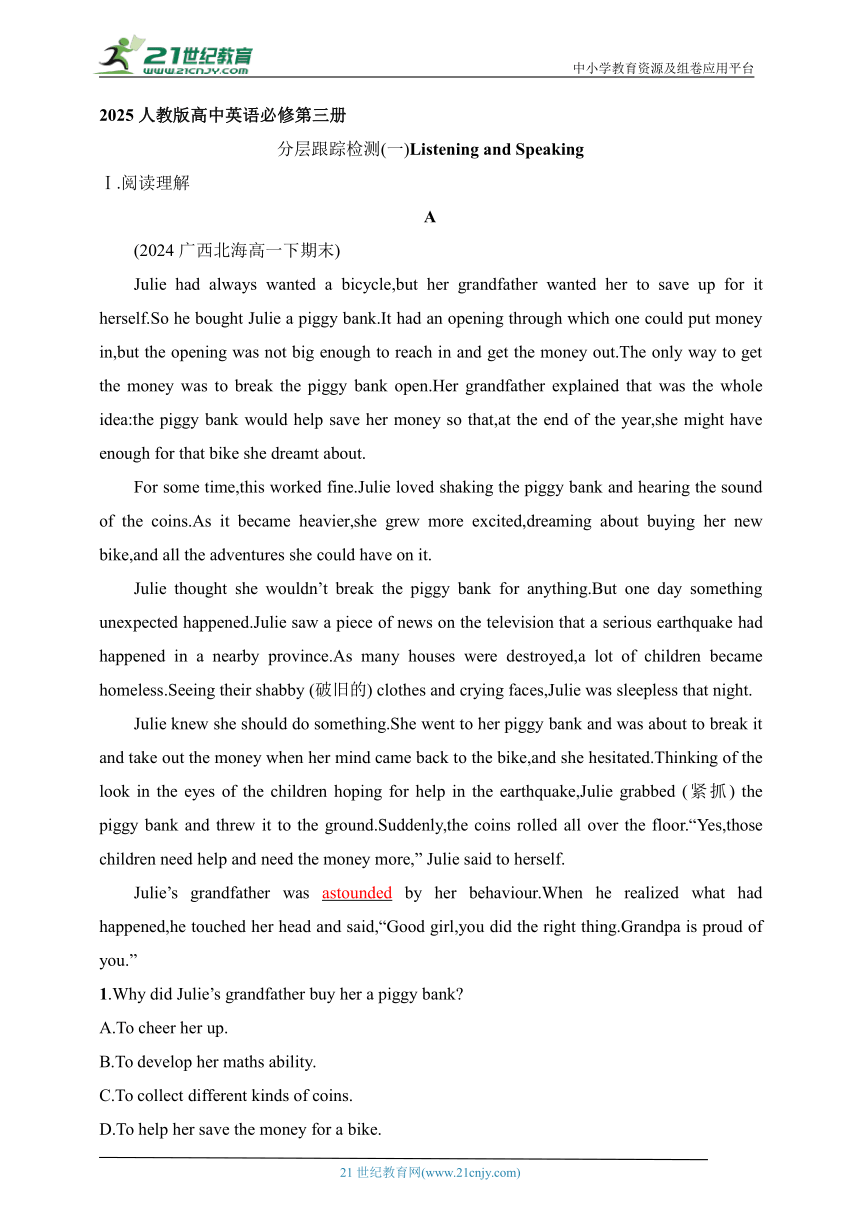 | |
| 格式 | docx | ||
| 文件大小 | 290.9KB | ||
| 资源类型 | 试卷 | ||
| 版本资源 | 人教版(2019) | ||
| 科目 | 英语 | ||
| 更新时间 | 2025-06-16 11:10:21 | ||
图片预览

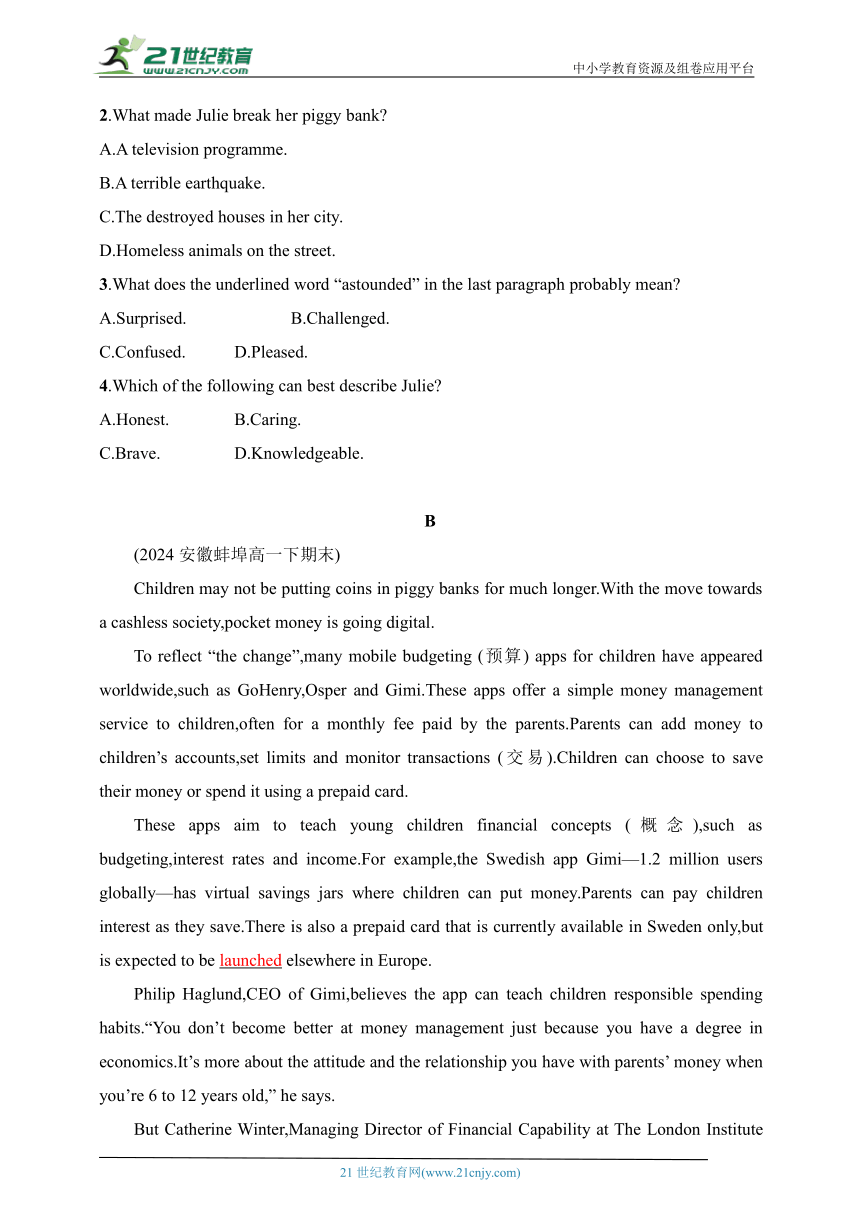
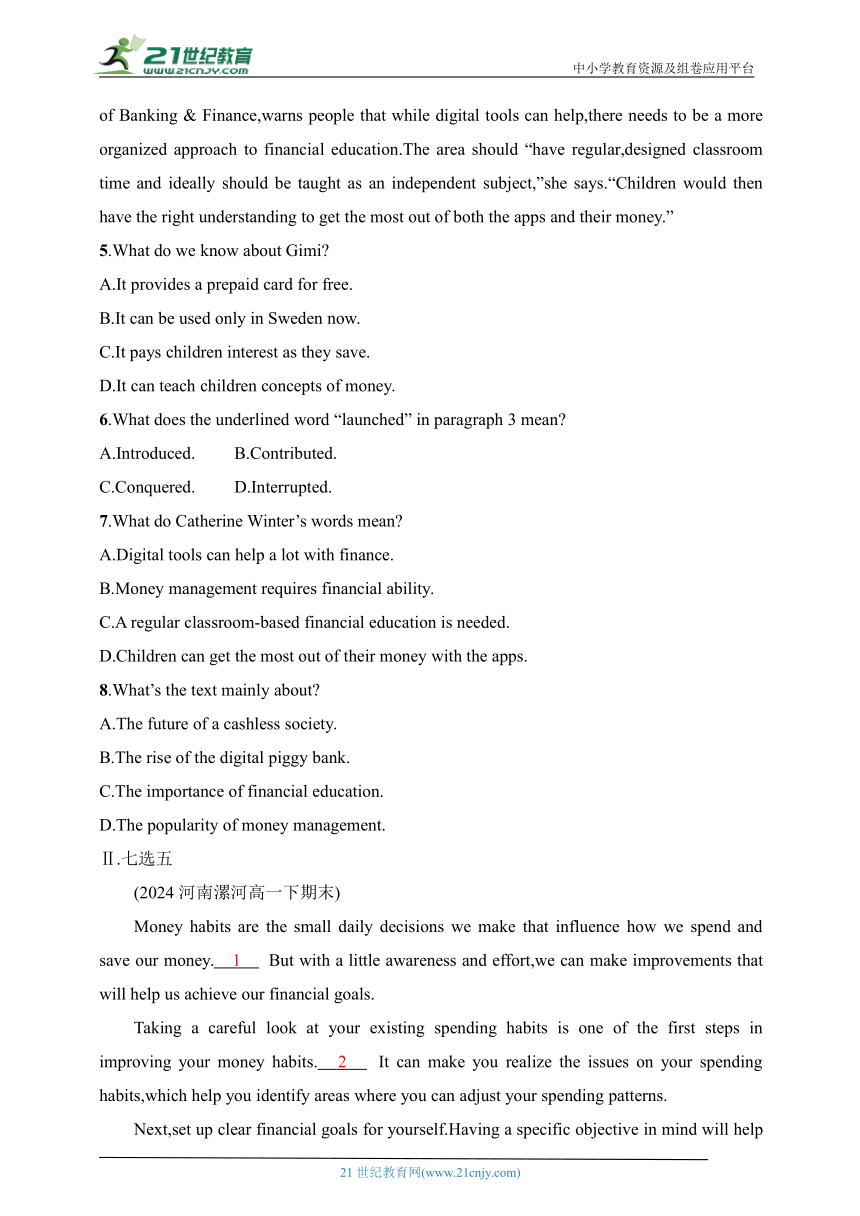
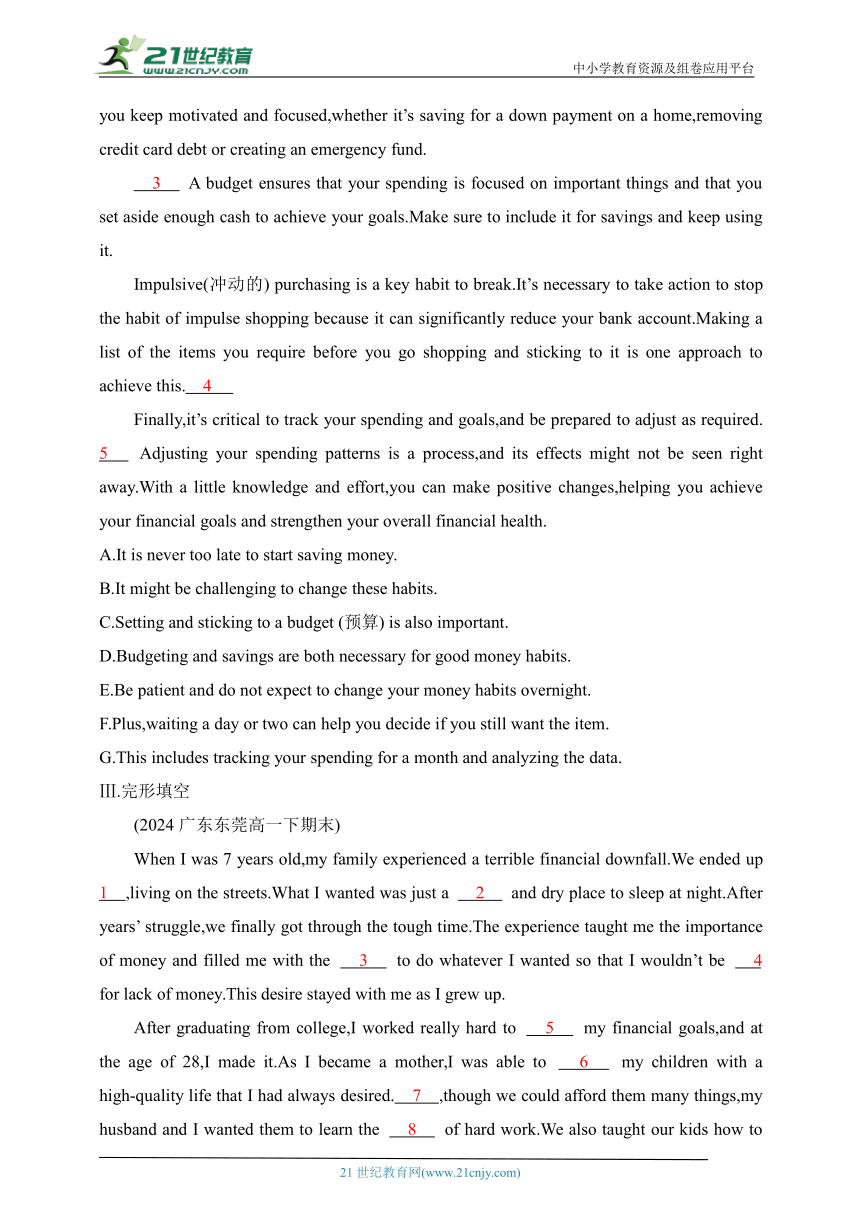
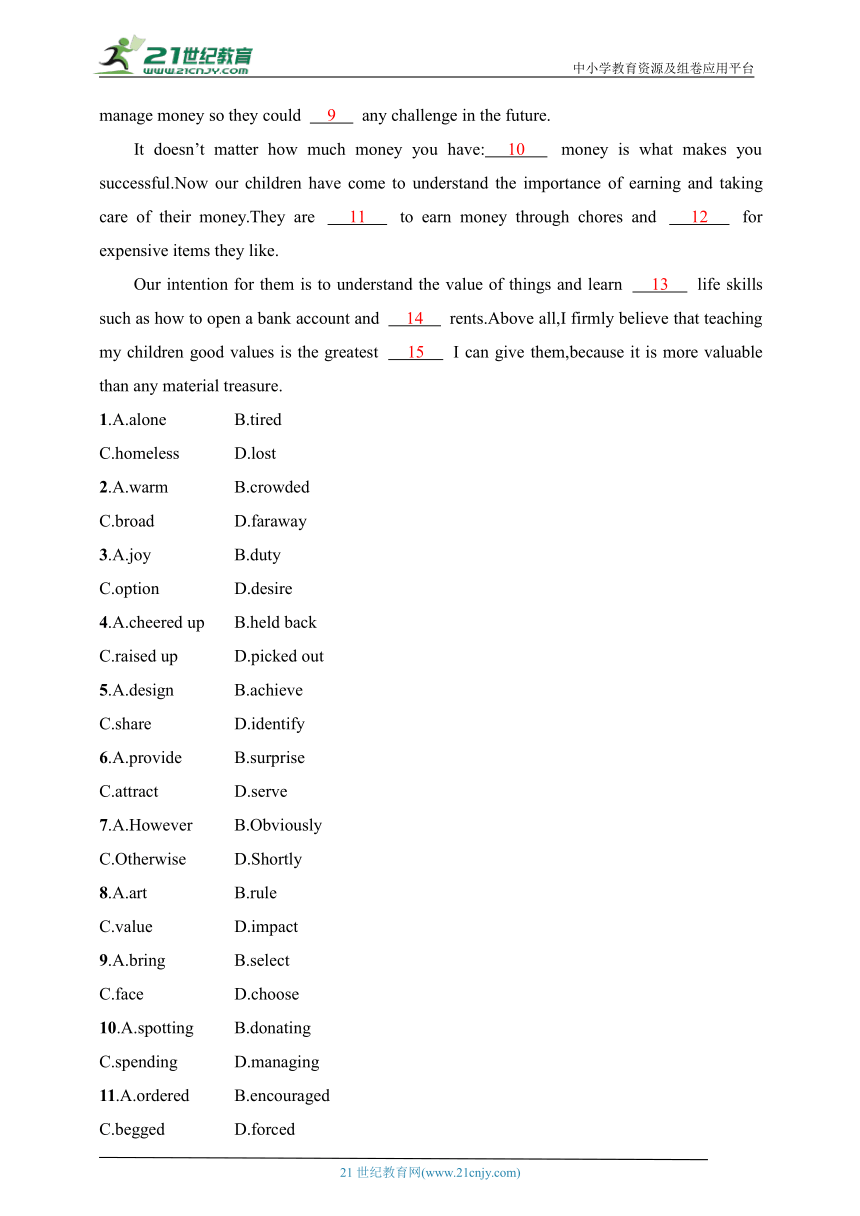
文档简介
中小学教育资源及组卷应用平台
2025人教版高中英语必修第三册
分层跟踪检测(一)Listening and Speaking
Ⅰ.阅读理解
A
(2024广西北海高一下期末)
Julie had always wanted a bicycle,but her grandfather wanted her to save up for it herself.So he bought Julie a piggy bank.It had an opening through which one could put money in,but the opening was not big enough to reach in and get the money out.The only way to get the money was to break the piggy bank open.Her grandfather explained that was the whole idea:the piggy bank would help save her money so that,at the end of the year,she might have enough for that bike she dreamt about.
For some time,this worked fine.Julie loved shaking the piggy bank and hearing the sound of the coins.As it became heavier,she grew more excited,dreaming about buying her new bike,and all the adventures she could have on it.
Julie thought she wouldn’t break the piggy bank for anything.But one day something unexpected happened.Julie saw a piece of news on the television that a serious earthquake had happened in a nearby province.As many houses were destroyed,a lot of children became homeless.Seeing their shabby (破旧的) clothes and crying faces,Julie was sleepless that night.
Julie knew she should do something.She went to her piggy bank and was about to break it and take out the money when her mind came back to the bike,and she hesitated.Thinking of the look in the eyes of the children hoping for help in the earthquake,Julie grabbed (紧抓) the piggy bank and threw it to the ground.Suddenly,the coins rolled all over the floor.“Yes,those children need help and need the money more,” Julie said to herself.
Julie’s grandfather was astounded by her behaviour.When he realized what had happened,he touched her head and said,“Good girl,you did the right thing.Grandpa is proud of you.”
1.Why did Julie’s grandfather buy her a piggy bank
A.To cheer her up.
B.To develop her maths ability.
C.To collect different kinds of coins.
D.To help her save the money for a bike.
2.What made Julie break her piggy bank
A.A television programme.
B.A terrible earthquake.
C.The destroyed houses in her city.
D.Homeless animals on the street.
3.What does the underlined word “astounded” in the last paragraph probably mean
A.Surprised. B.Challenged.
C.Confused. D.Pleased.
4.Which of the following can best describe Julie
A.Honest. B.Caring.
C.Brave. D.Knowledgeable.
B
(2024安徽蚌埠高一下期末)
Children may not be putting coins in piggy banks for much longer.With the move towards a cashless society,pocket money is going digital.
To reflect “the change”,many mobile budgeting (预算) apps for children have appeared worldwide,such as GoHenry,Osper and Gimi.These apps offer a simple money management service to children,often for a monthly fee paid by the parents.Parents can add money to children’s accounts,set limits and monitor transactions (交易).Children can choose to save their money or spend it using a prepaid card.
These apps aim to teach young children financial concepts (概念),such as budgeting,interest rates and income.For example,the Swedish app Gimi—1.2 million users globally—has virtual savings jars where children can put money.Parents can pay children interest as they save.There is also a prepaid card that is currently available in Sweden only,but is expected to be launched elsewhere in Europe.
Philip Haglund,CEO of Gimi,believes the app can teach children responsible spending habits.“You don’t become better at money management just because you have a degree in economics.It’s more about the attitude and the relationship you have with parents’ money when you’re 6 to 12 years old,” he says.
But Catherine Winter,Managing Director of Financial Capability at The London Institute of Banking & Finance,warns people that while digital tools can help,there needs to be a more organized approach to financial education.The area should “have regular,designed classroom time and ideally should be taught as an independent subject,”she says.“Children would then have the right understanding to get the most out of both the apps and their money.”
5.What do we know about Gimi
A.It provides a prepaid card for free.
B.It can be used only in Sweden now.
C.It pays children interest as they save.
D.It can teach children concepts of money.
6.What does the underlined word “launched” in paragraph 3 mean
A.Introduced. B.Contributed.
C.Conquered. D.Interrupted.
7.What do Catherine Winter’s words mean
A.Digital tools can help a lot with finance.
B.Money management requires financial ability.
C.A regular classroom-based financial education is needed.
D.Children can get the most out of their money with the apps.
8.What’s the text mainly about
A.The future of a cashless society.
B.The rise of the digital piggy bank.
C.The importance of financial education.
D.The popularity of money management.
Ⅱ.七选五
(2024河南漯河高一下期末)
Money habits are the small daily decisions we make that influence how we spend and save our money. 1 But with a little awareness and effort,we can make improvements that will help us achieve our financial goals.
Taking a careful look at your existing spending habits is one of the first steps in improving your money habits. 2 It can make you realize the issues on your spending habits,which help you identify areas where you can adjust your spending patterns.
Next,set up clear financial goals for yourself.Having a specific objective in mind will help you keep motivated and focused,whether it’s saving for a down payment on a home,removing credit card debt or creating an emergency fund.
3 A budget ensures that your spending is focused on important things and that you set aside enough cash to achieve your goals.Make sure to include it for savings and keep using it.
Impulsive(冲动的) purchasing is a key habit to break.It’s necessary to take action to stop the habit of impulse shopping because it can significantly reduce your bank account.Making a list of the items you require before you go shopping and sticking to it is one approach to achieve this. 4
Finally,it’s critical to track your spending and goals,and be prepared to adjust as required. 5 Adjusting your spending patterns is a process,and its effects might not be seen right away.With a little knowledge and effort,you can make positive changes,helping you achieve your financial goals and strengthen your overall financial health.
A.It is never too late to start saving money.
B.It might be challenging to change these habits.
C.Setting and sticking to a budget (预算) is also important.
D.Budgeting and savings are both necessary for good money habits.
E.Be patient and do not expect to change your money habits overnight.
F.Plus,waiting a day or two can help you decide if you still want the item.
G.This includes tracking your spending for a month and analyzing the data.
Ⅲ.完形填空
(2024广东东莞高一下期末)
When I was 7 years old,my family experienced a terrible financial downfall.We ended up 1 ,living on the streets.What I wanted was just a 2 and dry place to sleep at night.After years’ struggle,we finally got through the tough time.The experience taught me the importance of money and filled me with the 3 to do whatever I wanted so that I wouldn’t be 4 for lack of money.This desire stayed with me as I grew up.
After graduating from college,I worked really hard to 5 my financial goals,and at the age of 28,I made it.As I became a mother,I was able to 6 my children with a high-quality life that I had always desired. 7 ,though we could afford them many things,my husband and I wanted them to learn the 8 of hard work.We also taught our kids how to manage money so they could 9 any challenge in the future.
It doesn’t matter how much money you have: 10 money is what makes you successful.Now our children have come to understand the importance of earning and taking care of their money.They are 11 to earn money through chores and 12 for expensive items they like.
Our intention for them is to understand the value of things and learn 13 life skills such as how to open a bank account and 14 rents.Above all,I firmly believe that teaching my children good values is the greatest 15 I can give them,because it is more valuable than any material treasure.
1.A.alone B.tired
C.homeless D.lost
2.A.warm B.crowded
C.broad D.faraway
3.A.joy B.duty
C.option D.desire
4.A.cheered up B.held back
C.raised up D.picked out
5.A.design B.achieve
C.share D.identify
6.A.provide B.surprise
C.attract D.serve
7.A.However B.Obviously
C.Otherwise D.Shortly
8.A.art B.rule
C.value D.impact
9.A.bring B.select
C.face D.choose
10.A.spotting B.donating
C.spending D.managing
11.A.ordered B.encouraged
C.begged D.forced
12.A.ask B.vote
C.wait D.save
13.A.creative B.advanced
C.basic D.limited
14.A.pay B.collect
C.increase D.report
15.A.clue B.gift
C.sign D.fund
分层跟踪检测(一)Listening and Speaking
Ⅰ.【语篇解读】本文是一篇记叙文。文章讲述了Julie的祖父给了她一个储蓄罐,帮助她存钱买自行车,但是有爱心的Julie最后因为想给灾区捐款而打破了储蓄罐。
1.D 细节理解题。根据第一段中的“Julie had always wanted a bicycle,but her grandfather wanted her to save up for it herself.So he bought Julie a piggy bank.”可知,Julie的爷爷给她买储蓄罐是为了帮她攒钱买辆自行车。
2.B 细节理解题。根据第四段中的“Thinking of the look in the eyes...Julie said to herself.”可知,是可怕的地震让Julie打破了她的储蓄罐。
3.A 词句猜测题。第三段提到“Julie thought she wouldn’t break the piggy bank for anything.”,所以后来Julie突然打破储蓄罐,祖父肯定是很吃惊,知道原因后,又为她感到自豪。由此可推知“astounded”意为“吃惊的”,和surprised同义。
4.B 推理判断题。通读全文,尤其第四段可知,Julie把自己存的用于买自行车的钱慷慨地捐给灾区需要帮助的人,是一个富有同情心的人。
【语篇解读】本文是一篇说明文。文章介绍了随着无现金社会的发展,儿童零花钱也开始数字化,出现了多种移动预算应用程序,这些应用帮助儿童学习资金管理,父母可以监控和控制孩子的消费。专家提醒,虽然数字工具能提供帮助,但仍需系统化的金融教育来确保儿童正确理解和使用这些应用。
5.D 细节理解题。根据第三段中“These apps aim to teach young children...where children can put money.”可知,应用程序Gimi可以教孩子们金钱的概念。
6.A 词句猜测题。根据画线词的上文“There is also a prepaid card that is currently available in Sweden only”和下文“elsewhere in Europe”可知,这种目前仅在瑞典可用的预付卡应该是将会在欧洲其他地方推行,画线词意思应该是“发行,推行”,与Introduced意思一致。
7.C 推理判断题。根据最后一段中“The area should ‘have regular,designed classroom time and ideally should be taught as an independent subject,’she says.”可推知,Catherine Winter认为需要定期进行以课堂为基础的金融教育。
8.B 主旨大意题。通读全文,尤其是第一段可知,文章介绍了随着无现金社会的发展,儿童零花钱也开始数字化,出现了多种移动预算应用程序,这些应用帮助儿童学习资金管理,父母可以监控和控制孩子的消费。专家提醒,虽然数字工具能提供帮助,但仍需系统化的金融教育来确保儿童正确理解和使用这些应用。因此,文章的核心是“数字储蓄罐的兴起”这一现象。
Ⅱ.【语篇解读】本文是一篇说明文,主要介绍了如何通过改变日常的金钱习惯来影响我们的消费和储蓄方式,以及如何通过一些具体的方法来改善我们的财务状况。
1.B 根据上文“Money habits are the small daily decisions we make that influence how we spend and save our money.”以及下文“But with a little awareness and effort,we can make improvements that will help us achieve our financial goals.”可知,这里主要讲做出一些改变,我们可以实现财务目标。而B项“It might be challenging to change these habits.”符合语境,these habits代指上文Money habits,且本句与下文But后的内容形成转折关系,所以有承上启下的作用。故选B项。
2.G 根据上文“Taking a careful look at your existing spending habits is one of the first steps in improving your money habits.”可知,这里主要讲仔细审视你现有的消费习惯,接下来应该具体说明如何审视,所以G项“This includes tracking your spending for a month and analyzing the data.”符合语境,this指代上句内容,本句是对上文的进一步解释。故选G项。
3.C 根据下文“A budget ensures that your spending is focused on important things and that you set aside enough cash to achieve your goals.”可知,此处强调制定和坚持预算的重要性,而C项“Setting and sticking to a budget is also important.”符合语境,对下文有总括作用,其中a budget与下文对应。故选C项。
4.F 根据上文“It’s necessary to take action to stop the habit of impulse shopping because it can significantly reduce your bank account.”可知,这里主要讲减少冲动消费。而F项“Plus,waiting a day or two can help you decide if you still want the item.”符合语境,这是减少冲动消费的具体方法,所以有承上作用。故选F项。
5.E 根据下文“Adjusting your spending patterns is a process,and its effects might not be seen right away.”可知,这里主要讲你做出改变后效果不是立竿见影的。而E项“Be patient and do not expect to change your money habits overnight.”符合语境,有启下作用。故选E项。
Ⅲ.【语篇解读】本文是一篇记叙文。作者通过叙述她童年时期的贫困经历,成年后通过努力实现财务自由,并最终成为一位教育子女理解金钱价值和生活技能的母亲的故事,来展示个人奋斗和教育的重要性。
1.C 根据下文“living on the streets”可推断,他们一家住在街上,无家可归了。
2.A 根据上文“living on the streets”和下文“to sleep at night”可推断,晚上在街上睡觉通常又冷又潮,所以想要在干燥的温暖的地方睡觉。
3.D 本段最后一句“This desire stayed with me as I grew up.”说明作者实现自己愿望的渴望一直伴随着自己长大,由此可推断上文表述的是自己实现愿望的渴望。
4.B 根据本段第一句“my family experienced a terrible financial downfall” 可知,作者一家人经历了一场严重的经济衰退,再结合下文“for lack of money”可推断作者不想再因为缺乏金钱而受阻。
5.B 根据第一段最后两句话“The experience taught me the importance of money and filled me with the to do whatever I wanted so that I wouldn’t be for lack of money.This desire stayed with me as I grew up.”可知,作者经历了经济衰退后,决心努力而不再因为金钱受阻。由此可推断,作者毕业后非常努力实现自己的财务目标。
6.A 根据下文“we could afford them many things”可知,作者有经济能力给孩子们买很多东西,那么可推断作者有能力给孩子提供高品质的生活。
7.A 根据上文“I was able to my children with a high-quality life that I had always desired.”及下文“my husband and I wanted them to learn the of hard work”可知,两句话之间存在转折关系,所以要用however来表示这种关系。
8.C 根据上文“though we could afford them many things”可推断,作者和丈夫虽然能够给孩子买得起很多东西,还是想教会孩子努力工作的价值。
9.C 本句前后是因果关系,教孩子如何管理金钱是为了让孩子能够应对未来的经济方面的挑战。
10.D 根据下文“understand the importance of earning and taking care of their money”可知,现在作者的孩子们已经理解了赚钱和理财的重要性,理财就是管理金钱。
11.B 根据上文“understand the importance of earning and taking care of their money”可知,现在孩子们知道了挣钱和理财的重要性,因此孩子们被鼓励挣钱和攒钱。
12.D 见上题解析。
13.C 根据下文“such as how to open a bank account”可知,孩子们学会了开户等一些基本技能。
14.A 根据连接词and 和“how to open a bank account”可知,作者的孩子们学会的是金融方面的一些技能。
15.B 根据下文“more valuable than any material treasure”可知,作者希望给孩子们非物质的、对他们的未来有深远影响的东西。
21世纪教育网 www.21cnjy.com 精品试卷·第 2 页 (共 2 页)
21世纪教育网(www.21cnjy.com)
2025人教版高中英语必修第三册
分层跟踪检测(一)Listening and Speaking
Ⅰ.阅读理解
A
(2024广西北海高一下期末)
Julie had always wanted a bicycle,but her grandfather wanted her to save up for it herself.So he bought Julie a piggy bank.It had an opening through which one could put money in,but the opening was not big enough to reach in and get the money out.The only way to get the money was to break the piggy bank open.Her grandfather explained that was the whole idea:the piggy bank would help save her money so that,at the end of the year,she might have enough for that bike she dreamt about.
For some time,this worked fine.Julie loved shaking the piggy bank and hearing the sound of the coins.As it became heavier,she grew more excited,dreaming about buying her new bike,and all the adventures she could have on it.
Julie thought she wouldn’t break the piggy bank for anything.But one day something unexpected happened.Julie saw a piece of news on the television that a serious earthquake had happened in a nearby province.As many houses were destroyed,a lot of children became homeless.Seeing their shabby (破旧的) clothes and crying faces,Julie was sleepless that night.
Julie knew she should do something.She went to her piggy bank and was about to break it and take out the money when her mind came back to the bike,and she hesitated.Thinking of the look in the eyes of the children hoping for help in the earthquake,Julie grabbed (紧抓) the piggy bank and threw it to the ground.Suddenly,the coins rolled all over the floor.“Yes,those children need help and need the money more,” Julie said to herself.
Julie’s grandfather was astounded by her behaviour.When he realized what had happened,he touched her head and said,“Good girl,you did the right thing.Grandpa is proud of you.”
1.Why did Julie’s grandfather buy her a piggy bank
A.To cheer her up.
B.To develop her maths ability.
C.To collect different kinds of coins.
D.To help her save the money for a bike.
2.What made Julie break her piggy bank
A.A television programme.
B.A terrible earthquake.
C.The destroyed houses in her city.
D.Homeless animals on the street.
3.What does the underlined word “astounded” in the last paragraph probably mean
A.Surprised. B.Challenged.
C.Confused. D.Pleased.
4.Which of the following can best describe Julie
A.Honest. B.Caring.
C.Brave. D.Knowledgeable.
B
(2024安徽蚌埠高一下期末)
Children may not be putting coins in piggy banks for much longer.With the move towards a cashless society,pocket money is going digital.
To reflect “the change”,many mobile budgeting (预算) apps for children have appeared worldwide,such as GoHenry,Osper and Gimi.These apps offer a simple money management service to children,often for a monthly fee paid by the parents.Parents can add money to children’s accounts,set limits and monitor transactions (交易).Children can choose to save their money or spend it using a prepaid card.
These apps aim to teach young children financial concepts (概念),such as budgeting,interest rates and income.For example,the Swedish app Gimi—1.2 million users globally—has virtual savings jars where children can put money.Parents can pay children interest as they save.There is also a prepaid card that is currently available in Sweden only,but is expected to be launched elsewhere in Europe.
Philip Haglund,CEO of Gimi,believes the app can teach children responsible spending habits.“You don’t become better at money management just because you have a degree in economics.It’s more about the attitude and the relationship you have with parents’ money when you’re 6 to 12 years old,” he says.
But Catherine Winter,Managing Director of Financial Capability at The London Institute of Banking & Finance,warns people that while digital tools can help,there needs to be a more organized approach to financial education.The area should “have regular,designed classroom time and ideally should be taught as an independent subject,”she says.“Children would then have the right understanding to get the most out of both the apps and their money.”
5.What do we know about Gimi
A.It provides a prepaid card for free.
B.It can be used only in Sweden now.
C.It pays children interest as they save.
D.It can teach children concepts of money.
6.What does the underlined word “launched” in paragraph 3 mean
A.Introduced. B.Contributed.
C.Conquered. D.Interrupted.
7.What do Catherine Winter’s words mean
A.Digital tools can help a lot with finance.
B.Money management requires financial ability.
C.A regular classroom-based financial education is needed.
D.Children can get the most out of their money with the apps.
8.What’s the text mainly about
A.The future of a cashless society.
B.The rise of the digital piggy bank.
C.The importance of financial education.
D.The popularity of money management.
Ⅱ.七选五
(2024河南漯河高一下期末)
Money habits are the small daily decisions we make that influence how we spend and save our money. 1 But with a little awareness and effort,we can make improvements that will help us achieve our financial goals.
Taking a careful look at your existing spending habits is one of the first steps in improving your money habits. 2 It can make you realize the issues on your spending habits,which help you identify areas where you can adjust your spending patterns.
Next,set up clear financial goals for yourself.Having a specific objective in mind will help you keep motivated and focused,whether it’s saving for a down payment on a home,removing credit card debt or creating an emergency fund.
3 A budget ensures that your spending is focused on important things and that you set aside enough cash to achieve your goals.Make sure to include it for savings and keep using it.
Impulsive(冲动的) purchasing is a key habit to break.It’s necessary to take action to stop the habit of impulse shopping because it can significantly reduce your bank account.Making a list of the items you require before you go shopping and sticking to it is one approach to achieve this. 4
Finally,it’s critical to track your spending and goals,and be prepared to adjust as required. 5 Adjusting your spending patterns is a process,and its effects might not be seen right away.With a little knowledge and effort,you can make positive changes,helping you achieve your financial goals and strengthen your overall financial health.
A.It is never too late to start saving money.
B.It might be challenging to change these habits.
C.Setting and sticking to a budget (预算) is also important.
D.Budgeting and savings are both necessary for good money habits.
E.Be patient and do not expect to change your money habits overnight.
F.Plus,waiting a day or two can help you decide if you still want the item.
G.This includes tracking your spending for a month and analyzing the data.
Ⅲ.完形填空
(2024广东东莞高一下期末)
When I was 7 years old,my family experienced a terrible financial downfall.We ended up 1 ,living on the streets.What I wanted was just a 2 and dry place to sleep at night.After years’ struggle,we finally got through the tough time.The experience taught me the importance of money and filled me with the 3 to do whatever I wanted so that I wouldn’t be 4 for lack of money.This desire stayed with me as I grew up.
After graduating from college,I worked really hard to 5 my financial goals,and at the age of 28,I made it.As I became a mother,I was able to 6 my children with a high-quality life that I had always desired. 7 ,though we could afford them many things,my husband and I wanted them to learn the 8 of hard work.We also taught our kids how to manage money so they could 9 any challenge in the future.
It doesn’t matter how much money you have: 10 money is what makes you successful.Now our children have come to understand the importance of earning and taking care of their money.They are 11 to earn money through chores and 12 for expensive items they like.
Our intention for them is to understand the value of things and learn 13 life skills such as how to open a bank account and 14 rents.Above all,I firmly believe that teaching my children good values is the greatest 15 I can give them,because it is more valuable than any material treasure.
1.A.alone B.tired
C.homeless D.lost
2.A.warm B.crowded
C.broad D.faraway
3.A.joy B.duty
C.option D.desire
4.A.cheered up B.held back
C.raised up D.picked out
5.A.design B.achieve
C.share D.identify
6.A.provide B.surprise
C.attract D.serve
7.A.However B.Obviously
C.Otherwise D.Shortly
8.A.art B.rule
C.value D.impact
9.A.bring B.select
C.face D.choose
10.A.spotting B.donating
C.spending D.managing
11.A.ordered B.encouraged
C.begged D.forced
12.A.ask B.vote
C.wait D.save
13.A.creative B.advanced
C.basic D.limited
14.A.pay B.collect
C.increase D.report
15.A.clue B.gift
C.sign D.fund
分层跟踪检测(一)Listening and Speaking
Ⅰ.【语篇解读】本文是一篇记叙文。文章讲述了Julie的祖父给了她一个储蓄罐,帮助她存钱买自行车,但是有爱心的Julie最后因为想给灾区捐款而打破了储蓄罐。
1.D 细节理解题。根据第一段中的“Julie had always wanted a bicycle,but her grandfather wanted her to save up for it herself.So he bought Julie a piggy bank.”可知,Julie的爷爷给她买储蓄罐是为了帮她攒钱买辆自行车。
2.B 细节理解题。根据第四段中的“Thinking of the look in the eyes...Julie said to herself.”可知,是可怕的地震让Julie打破了她的储蓄罐。
3.A 词句猜测题。第三段提到“Julie thought she wouldn’t break the piggy bank for anything.”,所以后来Julie突然打破储蓄罐,祖父肯定是很吃惊,知道原因后,又为她感到自豪。由此可推知“astounded”意为“吃惊的”,和surprised同义。
4.B 推理判断题。通读全文,尤其第四段可知,Julie把自己存的用于买自行车的钱慷慨地捐给灾区需要帮助的人,是一个富有同情心的人。
【语篇解读】本文是一篇说明文。文章介绍了随着无现金社会的发展,儿童零花钱也开始数字化,出现了多种移动预算应用程序,这些应用帮助儿童学习资金管理,父母可以监控和控制孩子的消费。专家提醒,虽然数字工具能提供帮助,但仍需系统化的金融教育来确保儿童正确理解和使用这些应用。
5.D 细节理解题。根据第三段中“These apps aim to teach young children...where children can put money.”可知,应用程序Gimi可以教孩子们金钱的概念。
6.A 词句猜测题。根据画线词的上文“There is also a prepaid card that is currently available in Sweden only”和下文“elsewhere in Europe”可知,这种目前仅在瑞典可用的预付卡应该是将会在欧洲其他地方推行,画线词意思应该是“发行,推行”,与Introduced意思一致。
7.C 推理判断题。根据最后一段中“The area should ‘have regular,designed classroom time and ideally should be taught as an independent subject,’she says.”可推知,Catherine Winter认为需要定期进行以课堂为基础的金融教育。
8.B 主旨大意题。通读全文,尤其是第一段可知,文章介绍了随着无现金社会的发展,儿童零花钱也开始数字化,出现了多种移动预算应用程序,这些应用帮助儿童学习资金管理,父母可以监控和控制孩子的消费。专家提醒,虽然数字工具能提供帮助,但仍需系统化的金融教育来确保儿童正确理解和使用这些应用。因此,文章的核心是“数字储蓄罐的兴起”这一现象。
Ⅱ.【语篇解读】本文是一篇说明文,主要介绍了如何通过改变日常的金钱习惯来影响我们的消费和储蓄方式,以及如何通过一些具体的方法来改善我们的财务状况。
1.B 根据上文“Money habits are the small daily decisions we make that influence how we spend and save our money.”以及下文“But with a little awareness and effort,we can make improvements that will help us achieve our financial goals.”可知,这里主要讲做出一些改变,我们可以实现财务目标。而B项“It might be challenging to change these habits.”符合语境,these habits代指上文Money habits,且本句与下文But后的内容形成转折关系,所以有承上启下的作用。故选B项。
2.G 根据上文“Taking a careful look at your existing spending habits is one of the first steps in improving your money habits.”可知,这里主要讲仔细审视你现有的消费习惯,接下来应该具体说明如何审视,所以G项“This includes tracking your spending for a month and analyzing the data.”符合语境,this指代上句内容,本句是对上文的进一步解释。故选G项。
3.C 根据下文“A budget ensures that your spending is focused on important things and that you set aside enough cash to achieve your goals.”可知,此处强调制定和坚持预算的重要性,而C项“Setting and sticking to a budget is also important.”符合语境,对下文有总括作用,其中a budget与下文对应。故选C项。
4.F 根据上文“It’s necessary to take action to stop the habit of impulse shopping because it can significantly reduce your bank account.”可知,这里主要讲减少冲动消费。而F项“Plus,waiting a day or two can help you decide if you still want the item.”符合语境,这是减少冲动消费的具体方法,所以有承上作用。故选F项。
5.E 根据下文“Adjusting your spending patterns is a process,and its effects might not be seen right away.”可知,这里主要讲你做出改变后效果不是立竿见影的。而E项“Be patient and do not expect to change your money habits overnight.”符合语境,有启下作用。故选E项。
Ⅲ.【语篇解读】本文是一篇记叙文。作者通过叙述她童年时期的贫困经历,成年后通过努力实现财务自由,并最终成为一位教育子女理解金钱价值和生活技能的母亲的故事,来展示个人奋斗和教育的重要性。
1.C 根据下文“living on the streets”可推断,他们一家住在街上,无家可归了。
2.A 根据上文“living on the streets”和下文“to sleep at night”可推断,晚上在街上睡觉通常又冷又潮,所以想要在干燥的温暖的地方睡觉。
3.D 本段最后一句“This desire stayed with me as I grew up.”说明作者实现自己愿望的渴望一直伴随着自己长大,由此可推断上文表述的是自己实现愿望的渴望。
4.B 根据本段第一句“my family experienced a terrible financial downfall” 可知,作者一家人经历了一场严重的经济衰退,再结合下文“for lack of money”可推断作者不想再因为缺乏金钱而受阻。
5.B 根据第一段最后两句话“The experience taught me the importance of money and filled me with the to do whatever I wanted so that I wouldn’t be for lack of money.This desire stayed with me as I grew up.”可知,作者经历了经济衰退后,决心努力而不再因为金钱受阻。由此可推断,作者毕业后非常努力实现自己的财务目标。
6.A 根据下文“we could afford them many things”可知,作者有经济能力给孩子们买很多东西,那么可推断作者有能力给孩子提供高品质的生活。
7.A 根据上文“I was able to my children with a high-quality life that I had always desired.”及下文“my husband and I wanted them to learn the of hard work”可知,两句话之间存在转折关系,所以要用however来表示这种关系。
8.C 根据上文“though we could afford them many things”可推断,作者和丈夫虽然能够给孩子买得起很多东西,还是想教会孩子努力工作的价值。
9.C 本句前后是因果关系,教孩子如何管理金钱是为了让孩子能够应对未来的经济方面的挑战。
10.D 根据下文“understand the importance of earning and taking care of their money”可知,现在作者的孩子们已经理解了赚钱和理财的重要性,理财就是管理金钱。
11.B 根据上文“understand the importance of earning and taking care of their money”可知,现在孩子们知道了挣钱和理财的重要性,因此孩子们被鼓励挣钱和攒钱。
12.D 见上题解析。
13.C 根据下文“such as how to open a bank account”可知,孩子们学会了开户等一些基本技能。
14.A 根据连接词and 和“how to open a bank account”可知,作者的孩子们学会的是金融方面的一些技能。
15.B 根据下文“more valuable than any material treasure”可知,作者希望给孩子们非物质的、对他们的未来有深远影响的东西。
21世纪教育网 www.21cnjy.com 精品试卷·第 2 页 (共 2 页)
21世纪教育网(www.21cnjy.com)
